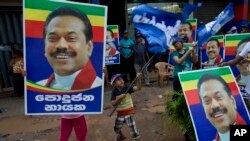Former Sri Lankan president Mahinda Rajapaksa has failed to stage a political comeback in the recent parliamentary elections. Voters in the island country indicate they have embraced continued political reform.
Even before final results were in, Prime Minister Ranil Wickremesinghe invited everyone to come together to “build a civilized society, build a consensual government and create a new country."
The coalition led by Wickremesinghe’s United National Party did not get a majority in the 225-member house, but won 106 seats, ahead of the 95 secured by Mahinda Rajapaksa’s alliance. Wickremesinghe will be able to form a broad-based government.
Rajapaksa became popular among the country's Sinhala majority for ending a Tamil civil war, but accusations of human rights abuses, repression of dissent, corruption and nepotism marred his 10-year rule.
He was ousted in January by Maithripala Sirisena, with Wickemesinghe's support. President Sirisena has tried to return the country to a more democratic path.
The director of Colombo’s National Peace Council, Jehan Perera, says Rajapaksa’s second defeat will strengthen Sirisena's efforts.
“And the sum and substance of these reforms is a commitment to the rule of law, to strengthening democratic institutions such as the judiciary, the police, the public service, all of which were highly politicized during Mr. Rajapaksa’s period,” Perera said.
Sirisena has altered course from his predecessor’s pro-China leanings to pursue a more balanced foreign policy.
South Asia analyst Sukh Deo Muni in New Delhi says countries like India and the United States have a much greater comfort level with Sirisena, who promises to investigate charges of widespread human rights abuses by the Rajapaksa government.
“China is one of the factors, China is not the only factor. You know the international community had problems on the human rights violations and accountability in which the Sirisena regime has been far more responsive," Muni said. "They have promised to hold an inquiry which meets the international standard.”
Perera, meanwhile, points out Beijing is an important trading and investment partner, and supporter in international forums, where Sri Lanka has been under fire for its human rights record. Analysts say the elections end a political transition period that began earlier this year.









